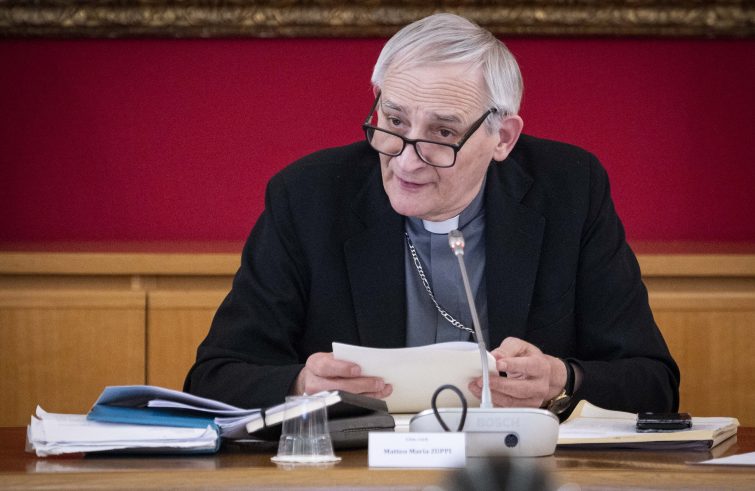
Peace. Peace is the word that Cardinal Matteo Zuppi, Archbishop of Bologna and President of the Italian Episcopal Conference, highlighted as a “priority” for the Italian Church during his opening address to the Italian Bishops’ Standing Committee, which is meeting in Rome until 20 March.
“Must we continue to accept that only war is the solution to conflicts? Does not repudiating war mean halting its continuation, or must we wait for irreparable events to occur before we can understand and decide?”
Congratulating Pope Francis on the eleventh anniversary of his Petrine ministry, Cardinal Zuppi recalled that peace is a “key word” of his pontificate: hence the commitment to be “artisans of peace, builders of unity in every context, peacemakers in word and deed, careful not to call our neighbour ‘fool’, learning to love our enemies and transforming them into what they truly are: our brothers and sisters.” This peace becomes prayer and solidarity, the cardinal added. He announced a special day of prayer, fasting and solidarity for all those afflicted by ongoing conflicts to be held at the next plenary assembly of the Italian Bishops’ Conference in May.
“We are experiencing a very long Good Friday”, was the analysis of the President of the Italian Bishops’ Conference, who noted that
“The Holy Father’s words on peace are anything but naive”:
“The Church is a mother, and she is witnessing war as a mother who considers life to be of greater value than any argument or orientation that departs from it.” Put simply, “only arguments in favour of peace can lead to a solution to the conflict, to the elimination of its causes, to the triumph of the rule of law and of supra-national responsibility”.
“History calls for a change of perspective, a different paradigm, with the involvement of the international community, in order to establish, together with the parties concerned, a just and lasting peace”,
he proposed: “It is precisely in this respect that the states and peoples of Europe, the EU institutions, must rediscover their original vocation”, also “by responsibly electing MEPs who represent our values and who will serve the common good in the next European Parliament”, in the forthcoming June elections.
“We cannot accept an uncontrolled arms race, let alone war as a gateway to peace”,
he said, referring to the ongoing conflicts that are “planning the annihilation of fellow human beings”: “Italy – and Europe? – rejects war as an instrument of aggression against the freedom of other peoples and as a means of settling international disputes,” he said, quoting from the Italian Constitution.
“There are widespread concerns about the country’s resilience, especially in those areas that have been struggling for a long time with economic and social crisis, depopulation and lack of services”,
was the appeal made on behalf of the Italian Church: “May the institutional context not fail to promote a harmonious development based on the principles of solidarity, subsidiarity and social cohesion.” Moreover, he voiced concern about “signals coming, for the first time, from the world of young people”: “The Church in Italy is aware of the difficulties faced by children and young people and wishes to respond to their expectation to be heard and understood in their demands, dreams and difficulties, which they express in ways that are not always straightforward, but which must be welcomed as signs of renewed dialogue”, assured the President of the Italian Episcopal Conference. In recent years, the situation of the elderly “has become a real emergency”, he continued, stressing that “Italy is one of the countries with the highest life expectancy in the world, but ageing is often inversely proportional to the ability to carry out daily tasks autonomously, making external support indispensable.”
“A new welfare system is needed to support this large segment of the population, especially those who are not self-sufficient”,
said the President of the Italian Episcopal Conference, who called for an increase in palliative care, “free of discretionary powers at regional level.” He called for “the full enforcement of the law on advance care planning”. His Eminence went on to review the Synodal Way of the Churches in Italy: “It’s time to translate listening into clear, far-sighted governmental decisions that will allow our Way to have an actual impact, along with a shared responsibility of the whole Church at different levels,” said Zuppi. Referring to the debate on the future of the Church, the President of the Italian Bishops’ Conference noted that
“There has never been a legendary golden age in the Church”:
“The faithful should not look to the past and complain about the present of the Church or of the country. As Pope Francis points out in his Jubilee Letter for 2025, the Church has a long historical past and is in some ways marked by it, but – anchored in the present – she looks to the future with hope”. “We must restore a climate of trust and hope in our Church, freeing ourselves from bitterness and transforming it into a commitment, a project, an experience,” the Cardinal exhorted: “This is how the Church can and must be a sign of hope for Italian society avoiding the banalities of popular thought.”










